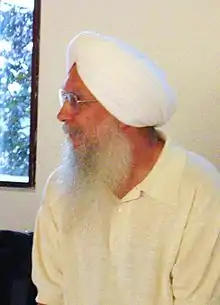Sat Bir Singh Khalsa
Sat Bir Singh Khalsa is a researcher in the field of body mind medicine, specializing in yoga therapy. Originally from Toronto, he earned his Ph.D. at the University of Toronto, where he also began his practice of Kundalini Yoga under the tutelage of Yogi Bhajan. He is (since 2006) an Assistant Professor of Medicine at Harvard Medical School and an Associate Neuroscientist (since 1998) in the Division of Sleep and Circadian Disorders, at the Departments of Medicine and Neurology, Brigham and Women's Hospital, in Boston Massachusetts. Since 2007, Sat Bir Singh Khalsa has served as the Director of Research at both the Kripalu Center for Yoga and Health in Massachusetts and the Kundalini Research Institute in New Mexico.
Sat Bir Singh Khalsa | |
|---|---|
 Sat Bir Singh Khalsa at University of Toronto | |
| Born | 20 December 1951 |
| Spouse(s) | Siri Krishna Kaur |
| Children | Hansmukh Kaur (daughter), Harimandir Singh (son) |
Research Studies
Sat Bir Singh Khalsa has participated in numerous mind-body studies. His work has been published in more than thirty papers. His most widely cited work explores human sleep cycles.[1]
Several of his other papers explore the application of yoga as therapy for insomnia, performance anxiety, mental health in a secondary school setting, drug addiction, depression, and as a predictor of low body mass and low medication usage.[2]
Media and Public Speaking
Sat Bir Singh Khalsa is often hired to speak about his research world wide, as the findings are helpful for the general public, government and NGOs, schools, universities and corporations alike.
In 2013 lead was hosted to lead an online panel discussion about the effect of yoga on health.[3] In another example, he was positioned to share his expertise in an online radio show type conversation format with another notable yoga expert Dashama Konah Gordon[4]
In 2017, Sat Bir Singh Khalsa was flown to Coventry, UK for a preparatory discussion about yoga and corporate research with Dr Haley Beer, a research professor at Warwick University and Dashama Konah Gordon the founder of Pranashama Yoga Institute.[5] Sat Bir was invited to offer his consulting expertise from his background in medical research at Harvard to develop a yoga research project to demonstrate through qualitative research how yoga and mediation can help people in corporate settings access the Flow State to attain greater well being, creativity and productivity.[6]
General Publications
- Sat Bir Singh Khalsa. (2009). "Kundalini Yoga as Therapy: A Research Perspective," chapter in Kundalini Rising: Exploring the Awakening of Kundalini. Boulder Colorado, Sounds True, Inc.
- Sat Bir Singh Khalsa with Jodie Gould (2012). Your Brain on Yoga. Rosetta Books.
Sources
Links to Research Articles
- Khalsa, SB; Jewett, ME; Cajochen, C; Czeisler, CA (2003). "A Phase Response Curve to Single Bright Light Pulses in Human Subjects". The Journal of Physiology. 549 (Pt 3): 945–952. doi:10.1113/jphysiol.2003.040477. PMC 2342968. PMID 12717008., (1999) EEG and ocular correlates of circadian melatonin phase and human performance decrements during sleep loss http://ajpregu.physiology.org/content/277/3/R640, Herzog, Erik D.; Geusz, Michael E.; Khalsa, Sat Bir S.; Straume, Martin; Block, Gene D. (1997-05-23). "Circadian rhythms in mouse suprachiasmatic nucleus explants on multimicroelectrode plates". Brain Research. 757 (2): 285–290. doi:10.1016/S0006-8993(97)00337-5. PMID 9200759., Gooley, J. J.; Chamberlain, K.; Smith, K. A.; Khalsa, S. B.; Rajaratnam, S. M.; Van Reen, E.; Zeitzer, J. M.; Czeisler, C. A.; Lockley, S. W. (2010). "Exposure to Room Light before Bedtime Suppresses Melatonin Onset and Shortens Melatonin Duration in Humans". The Journal of Clinical Endocrinology & Metabolism. 96 (3): E463–E472. doi:10.1210/jc.2010-2098. PMC 3047226. PMID 21193540.
- (2004) Treatment of chronic insomnia with yoga: a preliminary study with sleep-wake diaries Khalsa, Sat Bir S. (2004). "Treatment of Chronic Insomnia with Yoga: A Preliminary Study with Sleep?Wake Diaries". Applied Psychophysiology and Biofeedback. 29 (4): 269–278. doi:10.1007/s10484-004-0387-0. PMID 15707256., (2012) Evaluation of the mental health benefits of yoga in a secondary school: a preliminary randomized control trial https://link.springer.com/article/10.1007/s11414-011-9249-8#page-1, (2008) Evaluation of a residential kundalini yoga lifestyle pilot program for addiction in India Khalsa, Sat Bir S.; Khalsa, Gurucharan S.; Khalsa, Hargopal K.; Khalsa, Mukta K. (2008). "Evaluation of a Residential Kundalini Yoga Lifestyle Pilot Program for Addiction in India". Journal of Ethnicity in Substance Abuse. 7 (1): 67–79. doi:10.1080/15332640802081968. PMID 19842301., (2011) Increased Hatha yoga experience predicts lower body mass index and reduced medication use in women over 45 years Moliver, N; Mika, E; Chartrand, M; Burrus, S; Haussmann, R; Khalsa, S (2011). "Increased Hatha yoga experience predicts lower body mass index and reduced medication use in women over 45 years". Int J Yoga. 4 (2): 77–86. doi:10.4103/0973-6131.85490. PMC 3193658. PMID 22022126.
- "Benefits of Yoga with Harvard Researcher". Curetalks.com. Retrieved 23 August 2018.
- "Dr.Sat Bir Singh Khalsa In Conversation With Dashama on The Cure Panel Talk Show on YOGA". Trialx.com. Retrieved 23 August 2018.
- "Yoga - Its Benefits in the Workplace". Wbs.ac.uk. Retrieved 23 August 2018.
- "Warwick Business School Teams Up with Harvard and Pranashama Yoga Institute" (PDF). wbs.ac.uk. Retrieved 30 August 2018.